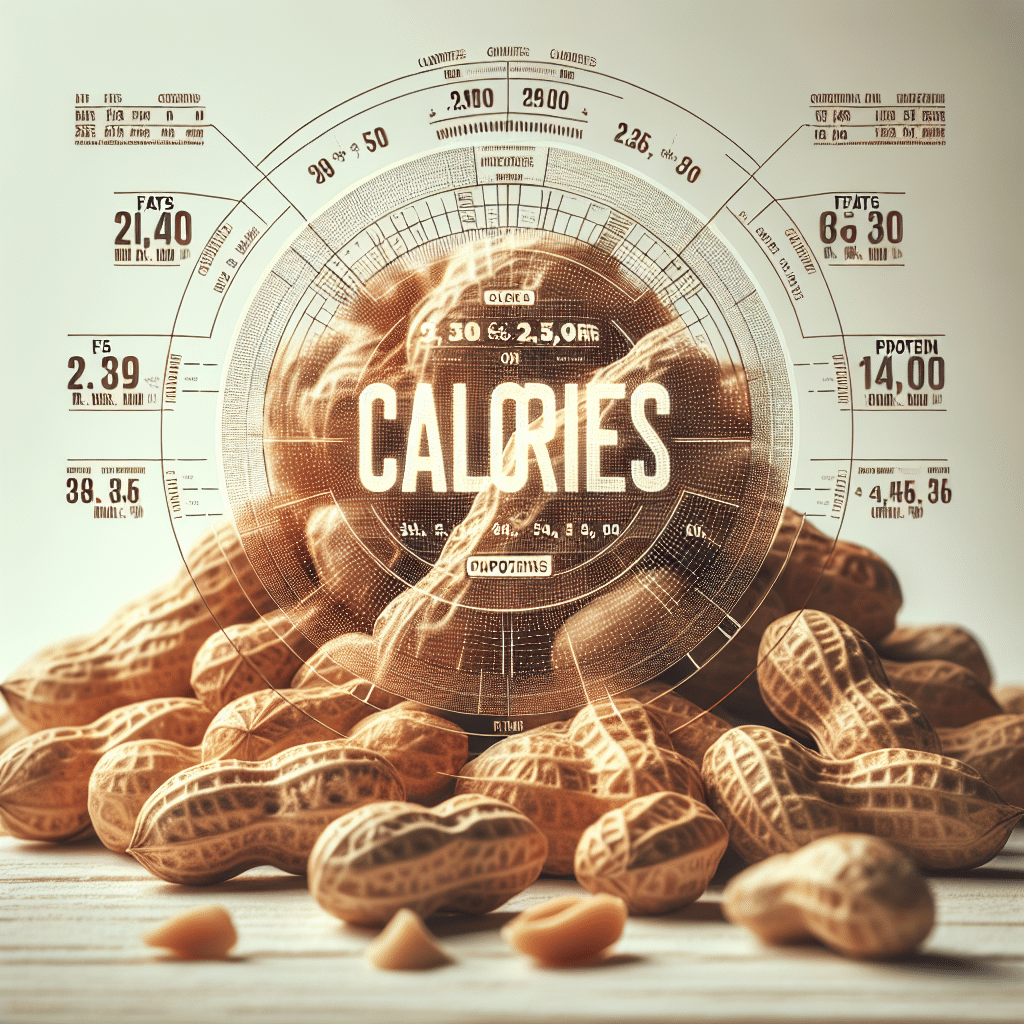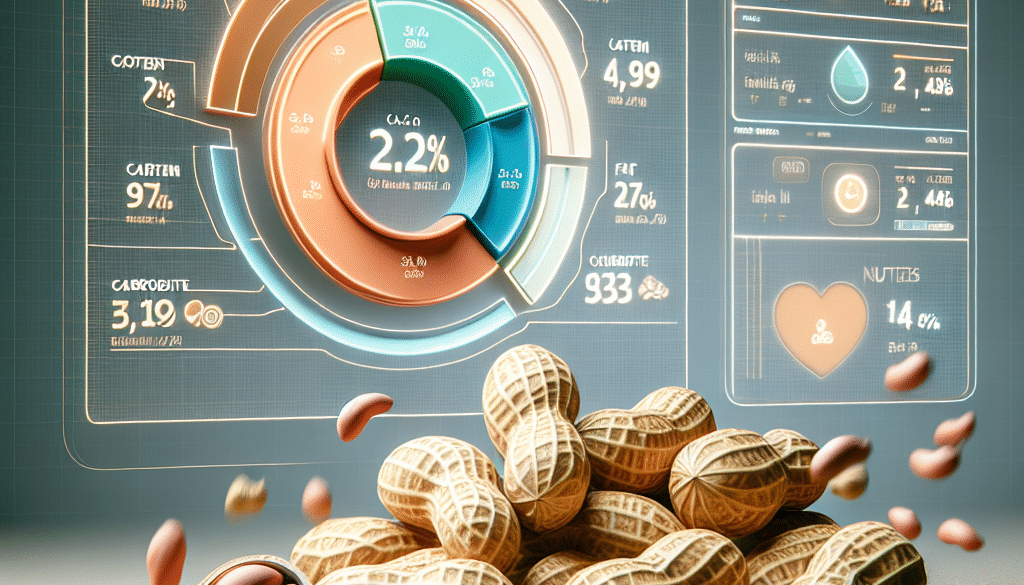Shell Peanuts Calories: Crunching The Nutritional Numbers
-
Table of Contents
- Shell Peanuts Calories: Crunching the Nutritional Numbers
- Understanding the Caloric Content of Shell Peanuts
- Nutritional Breakdown of Shell Peanuts
- Health Benefits of Shell Peanuts
- Incorporating Shell Peanuts into a Balanced Diet
- Conclusion: The Nutritional Value of Shell Peanuts
- Discover ETprotein’s High-Quality Protein Products
Shell Peanuts Calories: Crunching the Nutritional Numbers

Peanuts, often found in their shell at ball games and backyard barbecues, are not only a fun snack to crack open but also a powerhouse of nutrition. While they are commonly referred to as nuts, peanuts are actually legumes, related more closely to beans and lentils than to almonds and walnuts. Despite this botanical distinction, peanuts share many nutritional benefits with tree nuts and are a staple in diets worldwide. In this article, we’ll delve into the caloric content of shell peanuts and explore their nutritional profile, health benefits, and how they fit into a balanced diet.
Understanding the Caloric Content of Shell Peanuts
Peanuts in their shells, or “shell peanuts,” are often consumed as a whole food snack. The calorie content of peanuts can vary slightly depending on the type and preparation, but on average, a one-ounce serving (about 28 grams or a small handful) of shelled peanuts contains approximately 160 to 170 calories. This serving size typically equates to about 28 shelled peanuts or 14 peanuts still in their shells.
- Raw Shell Peanuts: A one-ounce serving of raw shell peanuts contains around 160 calories, with the majority of these calories coming from fats and proteins.
- Roasted Shell Peanuts: Roasting peanuts can slightly increase their calorie content due to the addition of oils during the roasting process. A one-ounce serving of roasted shell peanuts may contain up to 170 calories.
It’s important to note that while peanuts are calorie-dense, they are also nutrient-rich, providing a good balance of macronutrients.
Nutritional Breakdown of Shell Peanuts
Peanuts offer more than just calories; they are a rich source of essential nutrients. Here’s a closer look at what a one-ounce serving of shell peanuts provides:
- Protein: Approximately 7 grams, making them a good plant-based protein source.
- Fats: About 14 grams, predominantly monounsaturated and polyunsaturated fats, which are considered heart-healthy.
- Carbohydrates: Roughly 4.5 grams, with about 1.5 grams of fiber, aiding in digestion and satiety.
- Vitamins and Minerals: Peanuts are rich in B vitamins, vitamin E, magnesium, phosphorus, and potassium.
- Antioxidants: They contain bioactive compounds like resveratrol, coumaric acid, and phytosterols that have various health benefits.
Understanding the nutritional content of peanuts is crucial for incorporating them into a healthy diet without overindulging.
Health Benefits of Shell Peanuts
Despite their high calorie and fat content, peanuts have been associated with numerous health benefits when consumed in moderation:
- Heart Health: The monounsaturated and polyunsaturated fats in peanuts can help lower bad cholesterol levels, reducing the risk of heart disease.
- Weight Management: Peanuts have a high satiety factor, which can help control appetite and support weight management efforts.
- Blood Sugar Control: The low glycemic index and high fiber content of peanuts can help regulate blood sugar levels, making them a good snack for people with diabetes.
- Reduced Risk of Gallstones: Regular consumption of peanuts has been linked to a lower risk of gallstone formation.
These benefits highlight the importance of considering the quality of calories and the nutritional value of foods, rather than just their caloric content.
Incorporating Shell Peanuts into a Balanced Diet
While peanuts are nutritious, they should be consumed in moderation due to their high calorie density. Here are some tips for including shell peanuts in a balanced diet:
- Portion Control: Stick to a small handful (one ounce) as a serving to keep calorie intake in check.
- Choose Natural Varieties: Opt for peanuts without added salt or flavorings to avoid excess sodium and other additives.
- Combine with Other Foods: Pair peanuts with fruits or vegetables for a balanced snack that includes fiber, vitamins, and minerals.
- Use as a Protein Source: Add peanuts to salads, stir-fries, or homemade trail mixes for an extra protein boost.
By being mindful of serving sizes and preparation methods, peanuts can be a valuable addition to a healthful diet.
Conclusion: The Nutritional Value of Shell Peanuts
Shell peanuts are more than just a convenient snack; they are a nutrient-dense food that offers a variety of health benefits. With approximately 160-170 calories per ounce, peanuts are calorie-rich but also provide essential proteins, healthy fats, and a range of vitamins and minerals. When enjoyed in moderation and as part of a balanced diet, peanuts can contribute to heart health, weight management, and blood sugar control. By understanding the nutritional numbers behind shell peanuts, individuals can make informed choices about incorporating this wholesome legume into their diets.
Discover ETprotein’s High-Quality Protein Products
If you’re looking to enhance your diet with additional protein sources, consider exploring ETprotein’s range of organic bulk vegan protein and plant proteins. Their products, including organic rice protein, clear rice protein, pea protein, clear pea protein, pumpkin seed protein, sunflower seed protein, mung bean protein, and peanut protein, are known for their neutral taste and non-GMO, allergen-free attributes. Catering to various industries, ETprotein is a trusted manufacturer and supplier for those seeking high-quality protein solutions.
About ETprotein:
ETprotein, a reputable protein Chinese factory manufacturer and supplier, is renowned for producing, stocking, exporting, and delivering the highest quality organic bulk vegan protein and plant proteins. They include Organic rice protein, clear rice protein, pea protein, clear pea protein, pumpkin seed protein, sunflower seed protein, mung bean protein, peanut protein etc. Their offerings, characterized by a neutral taste, non-GMO, allergen-free attributes, cater to a diverse range of industries. They serve nutraceutical, pharmaceutical, cosmeceutical, veterinary, as well as food and beverage finished product distributors, traders, and manufacturers across Europe, USA, Canada, Australia, Thailand, Japan, Korea, Brazil, and Chile, among others.
ETprotein specialization includes exporting and delivering tailor-made protein powder and finished nutritional supplements. Their extensive product range covers sectors like Food and Beverage, Sports Nutrition, Weight Management, Dietary Supplements, Health and Wellness Products, and Infant Formula, ensuring comprehensive solutions to meet all your protein needs.
As a trusted company by leading global food and beverage brands and Fortune 500 companies, ETprotein reinforces China’s reputation in the global arena. For more information or to sample their products, please contact them and email sales(at)ETprotein.com today.












